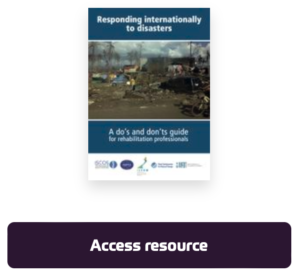For anyone helping the people of Ukraine this is an essential read.
 When disasters strike, there is always a huge amount of goodwill from rehabilitation professionals around the world who wish to use their skills to support those affected. This brief guidance informs those who are considering responding internationally to a disaster either as individuals or as part of a team. It highlights key questions to consider before departing, whilst working in the disaster area, and on returning home.
When disasters strike, there is always a huge amount of goodwill from rehabilitation professionals around the world who wish to use their skills to support those affected. This brief guidance informs those who are considering responding internationally to a disaster either as individuals or as part of a team. It highlights key questions to consider before departing, whilst working in the disaster area, and on returning home.
Responses to these questions considered are presented as “Do’s and Don’ts” which are exemplified by recommended practices and those to avoid in the real case studies below. The guidance note is not intended to be a step-by-step or technical guide, nor is it exhaustive, and does not supersede any specific guidance provided by your own global professional body.
Improving Access to Vital Resources
Rehabilitation services are a vital component in maintaining and improving population health, but services are only as good as the workforce delivering them. For the workforce to have the opportunity to provide the very best in patient care, it needs to be educated and supported through access to high-quality, evidence-based resources.
The Resource Repository provides a place where all the excellent resources developed by rehabilitation stakeholders around the world can be stored.
By improving the discoverability of globally relevant guidelines, manuals and toolkits, more rehabilitation professionals are able to find and use them. This ultimately improves dissemination of knowledge globally, and improves healthcare through the application of digital knowledge. This means better care of patients no matter where they are in the world.
You Can Get Involved – Download as well as Contribute Resources
The repository is a fully searchable web portal available at resources.relabhs.org. It has been designed from the from the ground up to be useful and relevant for all rehabilitation stakeholders and care providers around the world. This means you can access the repository on mobile devices or a computer and anywhere you have an internet connection.
As well as accessing the site from anywhere you can upload from anywhere too. When uploaded to the site the repository manager will check submissions to ensure the best content is available to be accessed. The resource repository manager will also continue to search for and evaluate new resources in an ongoing effort to keep new resources easily accessible to all.
This work is supported by the USAID funded Learning Acting Building for Rehabilitation in Health Systems (ReLAB-HS) project and is not possible without the generous and committed contribution of the Leahy War Victims fund.
ReLAB-HS is made possible by the generous support of the American people through the United States Agency for International Development (USAID) and is implemented under cooperative agreement number 7200AA20CA00033. The consortium is managed by prime recipient, Johns Hopkins Bloomberg School of Public Health.

